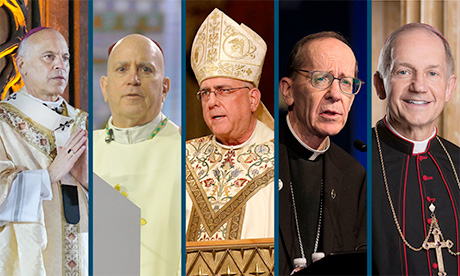When Archbishop Carlo Maria Viganò, the disgraced former papal nuncio to the United States, released an unprecedented and soon discredited letter in 2018 alleging Pope Francis’ complicity in covering up for former Cardinal Theodore McCarrick’s history of abuse, San Francisco’s Archbishop Salvatore Cordileone came to Viganò’s defence.
Despite Viganò’s shocking call for Pope Francis’ resignation, Cordileone was joined by a number of U.S. bishops who bolstered the testimony of the former nuncio. Among them, Denver Archbishop Samuel Aquila, Archbishop Joseph Naumann of Kansas City, Kansas, Phoenix Bishop Thomas Olmsted and Bishop Thomas Paprocki of Springfield, Illinois, all of whom issued personal statements or gave interviews echoing Cordileone’s praise of Viganò as a man of faith and integrity.
Today, those same bishops are also driving the controversial efforts aimed at pressing the U.S. bishops’ conference to draft a document that will have far sweeping effects to deny Communion to Catholic politicians who support pro-choice legislation.
When the U.S. bishops meet virtually June 16-18, they will vote on whether to proceed with drafting a document on the “meaning of the Eucharist in the life of the church,” a proposal championed through a series of pastoral letters, media appearances, personal articles and social media campaigns by the aforementioned bishops.
Yet the manner in which the debate among the U.S. prelates has played out — and the medium in which the body of bishops will hold this debate — has come under scrutiny in recent weeks, including by longtime former staffers at the U.S. bishops’ conference and high-ranking Vatican officials who see the rushed debate as a stark departure from Pope Francis’ call for dialogue.
In May, Cardinal Luis Ladaria, the head of the Vatican’s doctrinal office, sent a letter to Archbishop José Gomez of Los Angeles, president of the U.S. bishops’ conference, urging caution and outlining the necessary process for moving forward with such a document, which included greater discussion among the bishops, Catholic politicians and other episcopal conferences.
In response, 67 bishops sent a private letter to Gomez, which was later leaked, requesting that the vote on whether to move forward with such a document be postponed until the bishops could meet together to discuss the proposal in person. Gomez has informed the body of bishops the vote will proceed without delay.
John Carr, who for a quarter of a century worked as the top policy advisor for the U.S. bishops, described the open display of divisions, both among themselves and with Rome, as “unprecedented.”
“The idea that very direct warnings and guidance from the Vatican would simply be seen as an advisory opinion was not part of my experience,” Carr told NCR.
“The relentless campaigning for this proposal, the dismissal of other priorities, the leaking of correspondence, the impugning the motives of others is unprecedented in my experience.” Continue reading
- Image: NCR
News category: Analysis and Comment.




